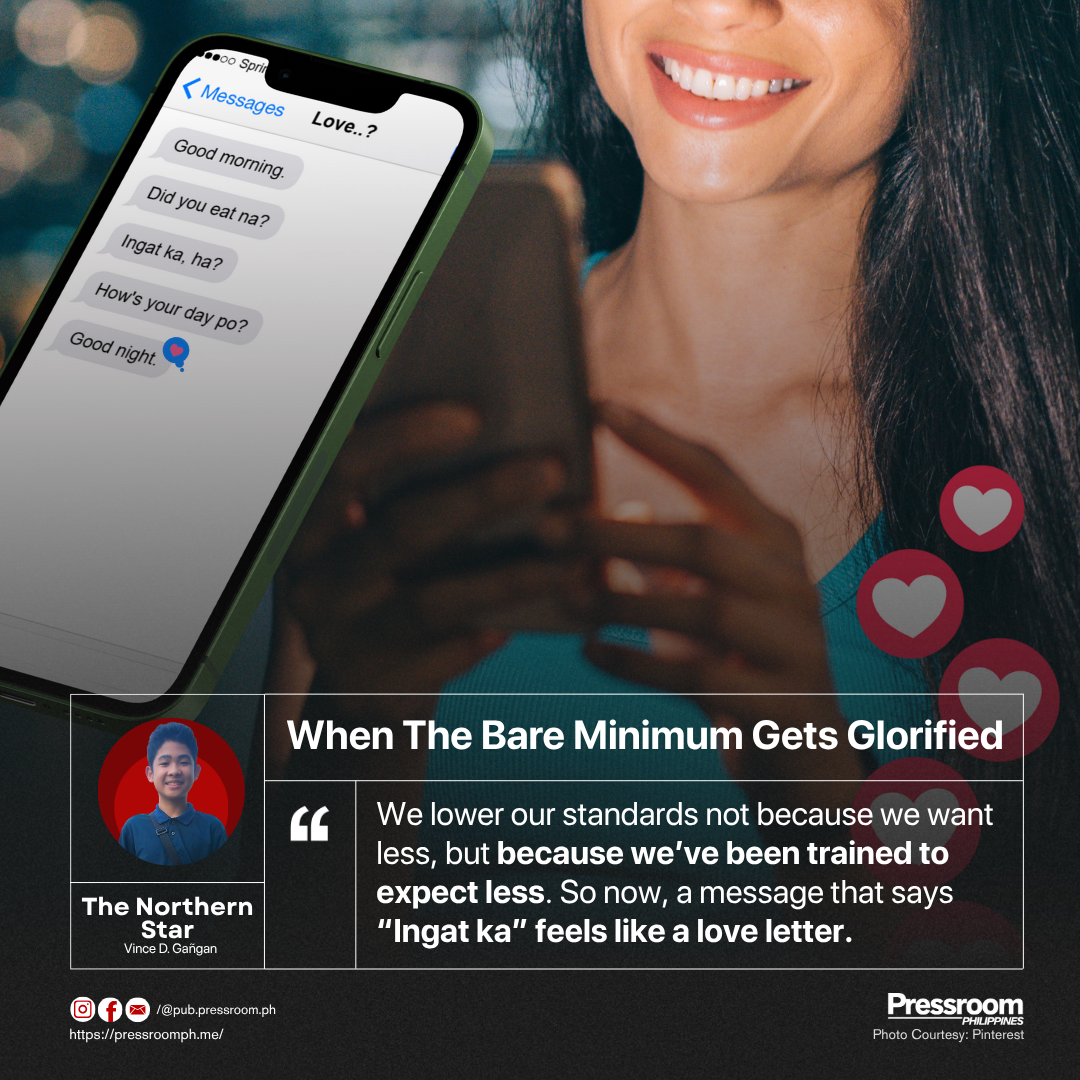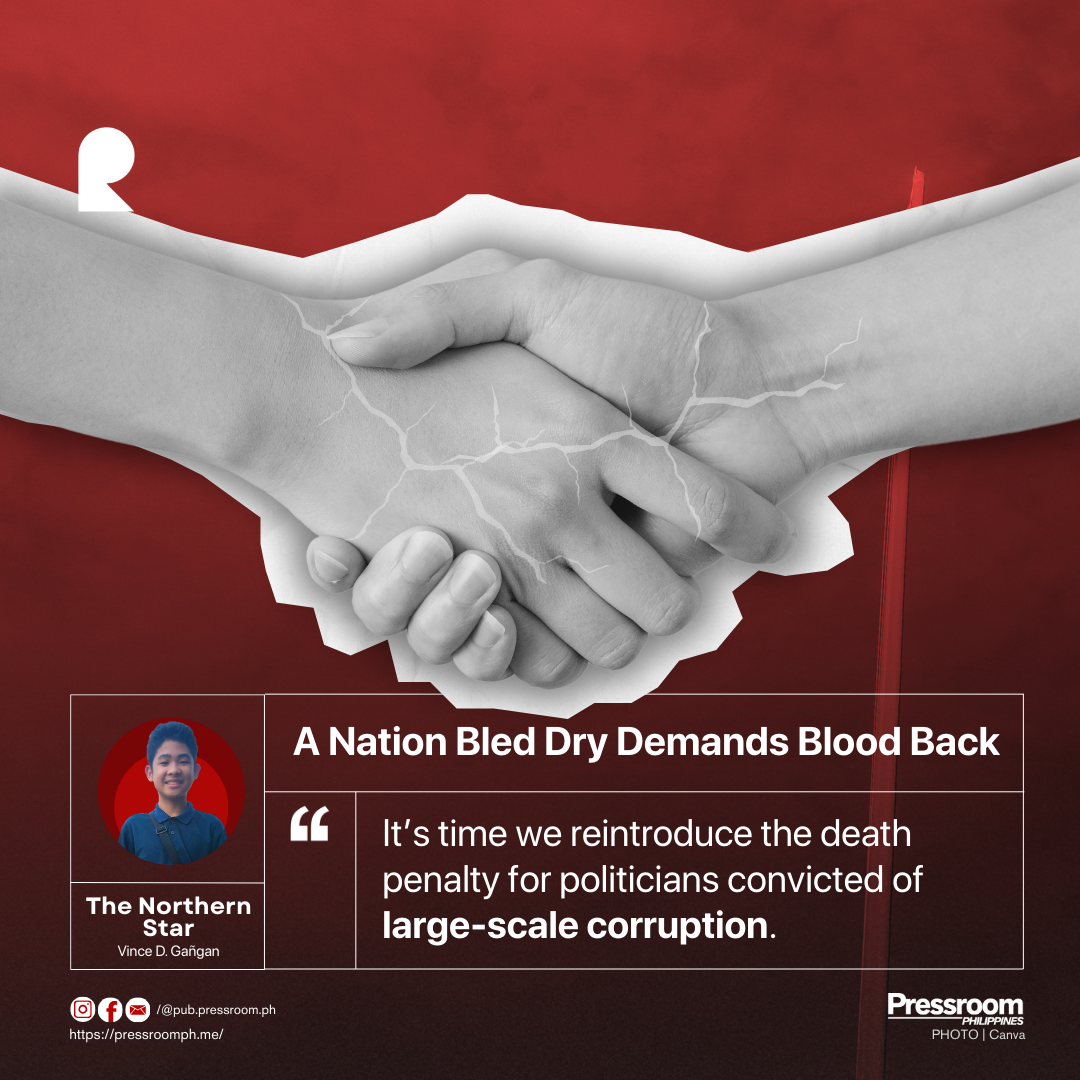via Vince D. Gañgan, Pressroom PH
“Good morning.” “Did you eat na?” “Ingat ka, ha?” “How's your day po?” “Good night.” Sweet? Maybe. But let’s not flatter ourselves—these are just basic expressions of care, not grand romantic feats. If you've ever been in a relationship, chances are you've melted over these words like butter on hot toast. Your heart races, your cheeks turn red, and suddenly you're acting like the lead character in a rom-com teleserye. But let’s be real: these aren’t grand gestures. These are just basic human decencies dressed up as romance. Yet, in today’s love culture, the bare minimum has been repackaged as something extraordinary.
It is disheartening to see this generation glorifying what should have been just the bare minimum when it comes to love. We go crazy when we're offered common courtesies, treating them as rare acts of devotion. The day where a goodnight text is enough to be labeled as a “relationship goal” is here. Gone are the days when effort meant deep conversations, thoughtful surprises, and real emotional investment.
There was a time when love was not only about saying “I care” but about showing it. Consistently, intentionally, and sacrificially. Now, people are obsessed over someone who simply replies fast or remembers their birthday. We're clapping for the most basic things because we've gotten so used to being ignored, ghosted, left on seen, or breadcrumbed. So when someone does the bare minimum, it feels like we’ve struck gold. But isn’t that the saddest part? That we are so starved for affection, we mistake crumbs for a full meal.
It's psychological, really. When people experience emotional neglect or are constantly surrounded by failed, toxic relationships the brain starts to adjust. We lower our standards not because we want less, but because we’ve been trained to expect less. So now, a message that says “Ingat ka” feels like a love letter. A three-minute call becomes a lifetime promise. The standards for feeling loved has become frighteningly low.
Many of us are in love with potential, not the person, not the effort, but the possibility that this person could turn out better. We accept half-baked affection, thinking it’s enough, because we are too afraid to ask for more. Why? Because we fear we’ll be seen as "too much." Too demanding. Too intense. Too emotional. So we stay silent, clinging to whatever scraps are given, convincing ourselves that “at least he checks up on me” is enough. But love should never feel like begging.
You deserve to be remembered without having to remind them. You deserve a partner who will listen even when it's inconvenient. You deserve consistency, not confusion. But all these start with the belief that you are worth more than the bare minimum. If we don’t start redefining what real love looks like, we will keep applauding the people who do the least, while turning away from those willing to do more.
Let’s not confuse effort with existence. A person who simply exists in your life that constantly likes your stories, reacts to your posts, or texts "good night" is not necessarily exerting effort. Real love takes work, not just presence. It’s not about grand gestures all the time, but about intentionality, accountability, and consistency. If love only shows up when it's convenient, then it was never real in the first place.
And this isn’t about being high maintenance, it’s about knowing your worth. It’s about setting boundaries and refusing to settle for less just because less is all you’ve known. A generation that knows how to romanticize soft boys and low-effort texting habits should also learn how to romanticize respect, growth, and emotional maturity.
But to be fair, maybe the glorification of the bare minimum isn’t entirely the fault of individuals. We’re in a culture that celebrates aesthetics over substance. Relationships are turned into highlight reels for social media, where a photo at Starbucks or a matching profile picture is the proof of love. And let’s not forget, many people weren’t taught what real love should look like, so they try to piece it together from fragments of validation, hoping it will feel whole.
Some might argue: “But we all show love differently. Isn’t it unfair to expect everyone to express it the same way?” And sure, that’s true. Not everyone is a poet, or someone who plans elaborate dates or writes love letters. But even the simplest kind of love should be rooted in effort. It’s not about being dramatic, it’s about being deliberate. If your partner’s “love language” is bare minimum effort, then maybe it’s time to ask: is that really a language, or just an excuse for laziness?
In conclusion, it is definitely alarming how low the bar has sunk when it comes to romance. Somewhere along the way, the standards got lost. What used to be a bare minimum is now praised like it's the pinnacle of love. And that? That says a lot about how this generation sees relationships, and maybe, just maybe, it's time we should stop glorifying the bare minimum and start demanding something real. Afterall, love should never feel like a favor, but should feel like a choice—an everyday commitment to do better, not just enough to keep the other from leaving.






